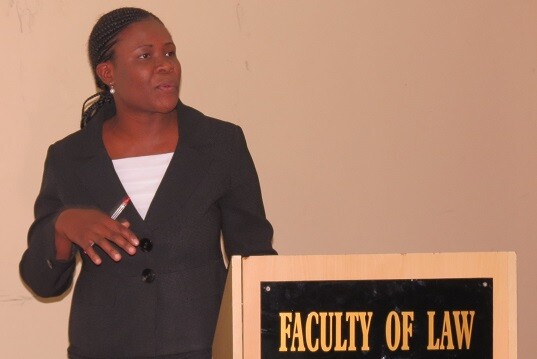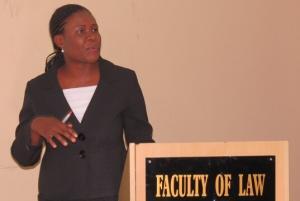
A legal scholar has punched holes into a proposed health law which demands women to get a police report in order to access abortion.

Gift Dorothy Makanje, a law lecturer who is also the supervisor of the clinic and Head of Foundational Law Department, made an emotive presentation bordering on abortion at Chancellor College on Wednesday.
The intellectual feast, dubbed students – staff seminar, was organized by the Health, HIV/AIDS legal clinic of the Faculty of Law—a clinic whose mission is to “provide the optimum legal and health educational experience for all stakeholders through advocacy, teaching, research, sensitization and service.”
Makanje presented a report titled “Framing of rape & incest indications for legal abortion in Malawi: rethinking the termination of pregnancy bill”.
She posed a number of controversial questions to the audience on whether they would object to abortion if it turns out that a father has impregnated own biological daughter or in the event that a girl is pregnant as a result of gang rape or defilement.
Deep into her presentation, Makanje pointed out that the Termination of Pregnancy (ToP) bill, yet to be tabled in parliament has a provision which will allow women in such situations to procure abortions “provided that the incident of rape, incest or defilement has been reported to Police, and that the pregnancy has not exceeded sixteen (16) weeks from the date of conception.”
On this, Makanje, who in her presentation said that deaths and/or complications cases, resulting from unsafe abortions, are on the increase in the country, pointed out that such a bill, if passed, will not cure the side effects associated with unsafe abortions in the country.
She added that such provision and other ‘restrictive’ provisions in the bill will not prevent abortions but will rather just impede access to safe abortion services arguing that women who are nevertheless determined to abort will resort to utilizing clandestine and unsafe means of abortion from quacks and risk complications and death.
In the final analysis, Makanje cited Malawi Law Commission Report & Guttmacher Report which says over K300 million is spent every year on post abortion care.
She concluded that the situation, if unchecked, will continue to burden taxpayers in treating such women in public hospitals due to post abortions complications.
Responding to the presentation, the audience expressed worry that the provision to have women present a police report to hospital for an abortion to take place would be tantamount to give them a license to abort willy-nilly.
In counter argument, Makanje said women are “rational beings” who, in her view, are expected to behave rationally.
Earlier on, Misheck Jere and Nerbet Chirwa, third and second year law students respectively, warmed up the stage for Makanje with their joint presentation, titled “The Prohibition of Compulsory Testing under the HIV/AIDS (Management and Prevention) Act 2017: An Own Goal?”.
The duo observed that section 18 of the said Act criminalizes compulsory HIV/AIDS testing and noted that this is somehow an ‘own goal’ in the prevention and management of HIV/AIDS.
Critiquing this presentation, some legal scholars observed that the right to privacy and to be treated with dignity is a first generational right which must not be overridden by a right to health care, a second generational right.














